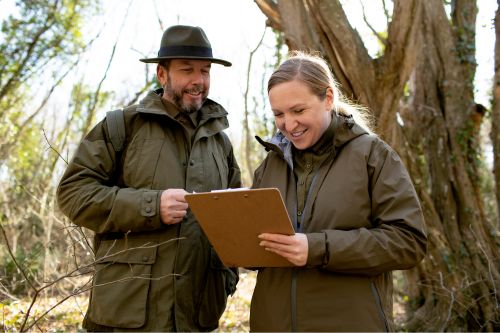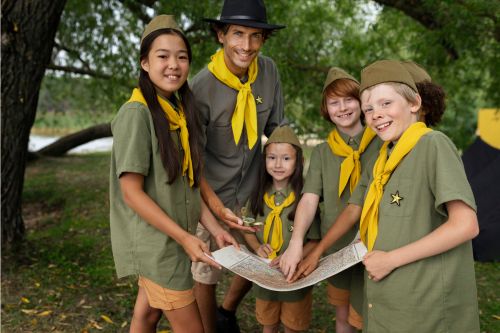Table of Contents
- About Wildlife Conservation Training Courses in South Africa
- Colleges offering Wildlife Conservation Training Courses in South Africa
- Why you should pursue Wildlife Conservation Training Courses in South Africa?
- Who should join this Wildlife Conservation Training course?
- Career scope for wildlife conservation course
- Key takeaways
- FAQs
About Wildlife Conservation Training Courses in South Africa
Experience a comprehensive course that combines theoretical knowledge with practical, immersive training. Developed by experienced professionals, this program offers a deep understanding of the latest conservation techniques and practices. Whether you’re a nature enthusiast or aspiring to a conservation career, this course covers it all. Students can engage in hands-on activities, such as Big 5 monitoring, data collection, and research. The wildlife conservation course also offers a chance to delve into wildlife management and ecological principles. It helps students contribute to ongoing research goals and actively participate in habitat and reserve management initiatives.
Colleges offering Wildlife Conservation Training Courses in South Africa
Collaborating with conservation agencies, local communities, governments, and educational institutions, these colleges train over 20,000 individuals from 56 countries worldwide. Students from these colleges are actively involved in 127 parks across Africa, playing a crucial role in protecting some of the planet’s most ecologically diverse regions.
These colleges mainly focus on specialized training for conservationists, aiming to cultivate a highly skilled conservation workforce in Africa. They are-
Southern African Wildlife College
Located in Mpumalanga, this renowned college specializes in conservation education and training. It offers a variety of programs, including field ranger training, conservation and environmental education, wildlife area management, and more.
University of Cape Town
The Department of Biological Sciences at the University of Cape Town offers undergraduate and postgraduate conservation biology and ecology programs. The university offers degrees such as a Bachelor of Science (BSc) in Ecology and Evolution or a Master of Science (MSc) in Conservation Biology.
Nelson Mandela University
Situated in Port Elizabeth, Nelson Mandela University offers a Bachelor of Science (BSc) degree in Zoology and Botany, with a focus on conservation biology. They also provide postgraduate research opportunities in the field.
University of KwaZulu-Natal
The School of Life Sciences at the University of KwaZulu-Natal offers various programs related to wildlife conservation, including a Bachelor of Science (BSc) in Wildlife Management and a Master of Science (MSc) in Conservation Genetics.
Tshwane University of Technology
Located in Pretoria, the Department of Nature Conservation at the Tshwane University of Technology offers a National Diploma and a Bachelor of Technology degree in Nature Conservation. These programs provide students with comprehensive training in wildlife and natural resource management and one of the best nature conservation courses.
Why you should pursue Wildlife Conservation Training Courses in South Africa?

Here are some key benefits and reasons why you should consider it-
Biodiversity hotspot
South Africa is renowned for its exceptional biodiversity, boasting diverse ecosystems and a wide range of iconic wildlife species. By participating in wildlife conservation training courses in South Africa, you can work in one of the world’s most biologically rich areas. You will also be able to contribute to preserving its unique flora and fauna.
Hands-on experience
These courses provide practical, hands-on training that allows you to gain invaluable experience in the field. You’ll be able to engage in activities such as wildlife monitoring, data collection, habitat restoration, and conservation research. These activities provide tangible skills and real-world conservation knowledge.
Expertise and knowledge
South Africa is home to experienced conservationists, researchers, and educators who offer their expertise in these training courses. Learning from professionals who have worked extensively in the field will give you insights into the most up-to-date conservation techniques, research methodologies, and management practices.
Diverse learning opportunities
The country’s varied landscapes and conservation areas provide diverse learning opportunities. From the vast savannahs of Kruger National Park to the lush wetlands of the iSimangaliso Wetland Park, you’ll encounter different ecosystems and wildlife habitats, enriching your understanding of conservation on a broader scale.
Who should join this Wildlife Conservation Training course?

Students who are strongly interested in expanding their knowledge of wildlife monitoring, wildlife management, and the principles underlying wildlife conservation can apply to this course. The requirements for joining include
Students must have a good physical condition, capable of walking in the field for at least 2 hours and enduring the peak-day heat when necessary.
Proficient in understanding, communicating, and writing in English.
Possesses an open-minded and enthusiastic attitude and a genuine passion for creating a positive impact.
Students must have an educational background in ecology or conservation, whether through previous courses, diplomas, degrees, or practical experiences in wildlife and habitat conservation. This background will help them quickly grasp theoretical and practical concepts relevant to the project’s requirements.
Career scope for wildlife conservation course
Wildlife veterinary
Wildlife veterinary specialize in providing medical care for various wildlife species, including birds, reptiles, and mammals. This job requires individuals to possess a strong educational background and qualifications in the field. Wildlife veterinarians are highly regarded and often receive generous compensation for their expertise in treating and caring for wildlife.
Mammal trainers
Mammal trainers train and demonstrate specific behaviors with marine mammals. They are responsible for the animals’ daily care, ensuring they receive proper nutrition and monitoring their behavioral patterns. A minimum of a two-year degree is typically required to become a mammal trainer, providing individuals with the necessary knowledge and skills for this role.
Zookeepers
Zookeepers are primarily responsible for attending to the needs of animals in a zoo setting. Their duties include tasks such as feeding, cleaning, administering medications, observing and reporting behavioral changes, and other related responsibilities. Zookeepers typically hold a relevant degree in wildlife or a related field to ensure they possess the necessary knowledge and expertise for the role.
Wildlife educators
Wildlife educators educate high school and university students about wildlife science and conservation. They play an important role in raising awareness and imparting knowledge about wildlife, biodiversity, and conservation practices. In addition to teaching, wildlife educators also contribute to research initiatives and policy development, further advancing the field of wildlife science and conservation.
Wildlife consultant
A wildlife consultant assesses ecosystems and evaluates the environmental consequences of various actions. Their role involves providing detailed reports to industries, businesses, and governments to ensure the preservation of the environment. Wildlife consultants contribute to maintaining the ecological balance and offer expertise in managing environmental impacts caused by human activities.
Key takeaways
- Wildlife conservation training courses in South Africa offer a combination of theoretical knowledge and practical experience, providing a deep understanding of the latest conservation techniques and practices.
- Colleges in South Africa, such as the Southern African Wildlife College and various universities, offer specialized training for aspiring conservationists, developing a highly skilled conservation workforce.
- The courses are suitable for nature enthusiasts and individuals aspiring to a career in conservation, requiring physical fitness, proficiency in English, an enthusiastic attitude, and a background in ecology or conservation.
Hope you found this blog on wildlife courses in South Africa inspiring! If you have any thoughts or additional insights, we would love to hear from you in the comments. For more information about these courses or any related queries, click here to contact us. Our team is here to assist you.
FAQs
Q1. Who is the most famous wildlife conservationist in the world?
Ans- Jane Goodall (born 1934) is a famous British primatologist, anthropologist, and conservationist. She studied the social and family dynamics of wild chimps since she was 26 years old.
Q2. What degree is best for wildlife conservation?
Ans- The best degree for studying wildlife conservation is MSc in Wildlife Conservation Action. It is a two-year postgraduate degree that trains students in wildlife sciences and prepares them to analyze, maintain, and monitor biodiversity.
Q3. How much does a nature conservationist earn in South Africa?
Ans- A Conservation Officer in their early career with 1-4 years of experience gets an average total compensation (tips, bonus, and overtime pay) of R160,539 per year.






